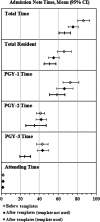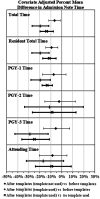The Impact of Diagnosis-Specific Plan Templates on Admission Note Writing Time: A Quality Improvement Initiative
- PMID: 39416400
- PMCID: PMC11475446
- DOI: 10.4300/JGME-D-24-00087.1
The Impact of Diagnosis-Specific Plan Templates on Admission Note Writing Time: A Quality Improvement Initiative
Abstract
Background There are limited objective studies regarding the effectiveness of strategies to alleviate the documentation burden on resident physicians. Objective To develop and implement diagnosis-specific templates for the plan of care section of inpatient admission notes, aiming to reduce documentation time. Methods Twelve templates for the plan of care section of admission notes were written by the study authors, reviewed by attending physicians, and shared with the residents through the electronic health record (EHR) on September 23, 2022. EHR audit log data were collected to examine admission note writing times, supplemented by resident feedback on acceptability via an anonymous survey. Feasibility measures included time investment, experience with the EHR, and resident training. Results Between July 1, 2021 and June 30, 2023, 62 pediatric residents contributed 9840 admission notes. The templates were used in 557 admission notes. The mean total time spent on an admission note decreased from 97.9 minutes pre-intervention to 71.0 minutes post-intervention with the use of a template; an adjusted reduction of 23% (95% CI 16%-30%; P<.001). The mean attending time spent editing an admission note was unchanged. The survey results underscored wide acceptability of the templates among the residents. Feasibility data showed that the project required minimal time investment from the health care informatics team and minimal resident training. Conclusions Using templates in the care plan section of admission notes reduces the time residents spend writing admission notes.
Figures




Similar articles
-
Resident Notes in an Electronic Health Record.Clin Pediatr (Phila). 2017 Mar;56(3):257-262. doi: 10.1177/0009922816658651. Epub 2016 Jul 20. Clin Pediatr (Phila). 2017. PMID: 27400934
-
Time and Note Characteristic Effects of an Electronic Health Record Template for Internal Medicine Resident Notes.J Grad Med Educ. 2024 Jun;16(3):304-307. doi: 10.4300/JGME-D-23-00553.1. Epub 2024 Jun 13. J Grad Med Educ. 2024. PMID: 38882418 Free PMC article.
-
Resident Workshop to Improve Inpatient Documentation Using the Progress Note Assessment and Plan Evaluation (PNAPE) Tool.MedEdPORTAL. 2020 Nov 30;16:11040. doi: 10.15766/mep_2374-8265.11040. MedEdPORTAL. 2020. PMID: 33274296 Free PMC article. Review.
-
Assessing the quality of electronic medical records as a platform for resident education.BMC Med Educ. 2021 Nov 13;21(1):577. doi: 10.1186/s12909-021-03011-0. BMC Med Educ. 2021. PMID: 34774027 Free PMC article.
-
Your note, your way: how to write an inpatient progress note accurately and efficiently as an intern.Postgrad Med J. 2023 Jun 8;99(1171):492-497. doi: 10.1136/postgradmedj-2022-141834. Postgrad Med J. 2023. PMID: 37294720 Review.
References
-
- The Office of the National Coordinator for Health Information Technology Adoption of electronic health records by hospital service type 2019-2021. Accessed June 15, 2023. https://www.healthit.gov/data/quickstats/adoption-electronic-health-reco....
MeSH terms
LinkOut - more resources
Full Text Sources
